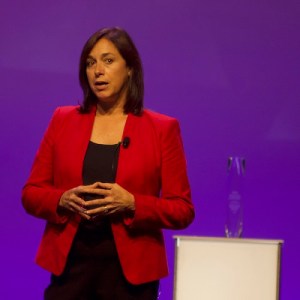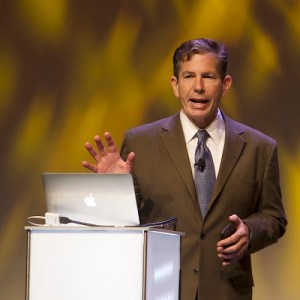HFMA’s Annual Conference: Karen DeSalvo talks about Google Health’s core strategies
- Healthcare organizations need to consider partnering in efforts to address the social determinants of health and make a true impact on their patients’ health, said Google Health’s Karen DeSalvo.
- Keynote speaker and physician entrepreneur Joel Selanikio said stakeholders need to be prepared for profound changes stemming from the consumerization of technology.
- DignifiHealth won this year’s Annual Conference Start-Up Cup competition.
- Dates and a location have been announced for the 2023 Annual Conference.
DENVER — Helping patients and consumers lead healthy lives is a massive undertaking that no organization should try to do on its own, Google Health’s Karen DeSalvo, MD, MPH, MSc, said Wednesday at HFMA’s Annual Conference.
“Remember that health is what we do together as a society to create the conditions in which everyone can be healthy,” she said. “No one institution, no one sector can do this alone. To meet the physical, emotional and social needs of people and communities, we’re going to have to do it in partnership.
“Use your power to address health beyond what you can do in your healthcare environment to drive great care. Go into and work with the community, where health happens and where you can have an opportunity to impact equity at scale.”
Ideally, she said, providers will go beyond their community benefit programs and incorporate strategies and tactics such as serving as an anchor institution, procuring products locally from women- and minority-owned businesses and addressing the social determinants of health.
“It’s a chance to be able to look back and say that we left it better than we found it,” DeSalvo said.

Honoring a decorated career
DeSalvo was on hand to receive HFMA’s Richard L. Clarke Board of Directors Award, which recognizes individuals or organizations for making significant positive contributions to the profession of healthcare or the financing of healthcare services, or for benefits to society related to healthcare.
In remarks to attendees, she described the career path that took her to the chief health officer role at Google Health. She said she’s long understood that “health is more than healthcare.”
Those lessons first became apparent early in her career as she cared for patients at Charity Hospital in New Orleans. The vast majority were from marginalized communities.
“My patients were typical of those served by many safety nets,” she said. “And instead of catching them, they often fell through.”
She remembers “many long days in clinic feeling frustrated about how much need there was for helping patients with all these nonmedical needs. And I felt really ill-equipped to help. I was trying to solve the problems I saw as a doctor through the lens of how I was trained, but what they needed from me went far beyond my medical training.”
In 2005, Hurricane Katrina drove home the point even more, motivating DeSalvo to ultimately change course in her career. She sought to devote herself “not only to improving access to the best-quality care, but also to address the social determinants of health … not only through our health system, but eventually through public health service.”
After serving as health commissioner for the City of New Orleans, DeSalvo accepted a high-ranking role at the U.S. Department of Health and Human Services during the Obama administration, hoping to take the lessons she’d learned and apply them on a national scale. With Google Health, which she joined in December 2019, the scope of the opportunity became even bigger.
“This company was well-positioned to positively impact people’s health at an immense global scale,” DeSalvo said. “I also [joined] because I believed that our tools and technology would be able to augment care and help drive equitable access, not only to great healthcare but to optimal health for everyone.”
A focus on reliable information
The goal at Google Health is to “meet users where they are through products and services,” DeSalvo said.
Noting that three-quarters of people search for health-related answers online before seeking care, DeSalvo said it’s vital to ensure access to high-quality information. For example, on YouTube, “We’re elevating authoritative and culturally relevant health information, partnering with organizations like the American College of Physicians, the New England Journal of Medicine and also with influencers who already have broad audiences that follow them to help spread those important evidence-based messages.”
Google Health also strives to anticipate what users will need once they have the information they sought.
“We make it easier to find a doctor who takes your insurance, who speaks your language, and then helping people to actually book an appointment directly online,” DeSalvo said. “This is part of our way of curating the ecosystem, your ecosystem, to make it easier for people to find you.”
Google Health also partners with providers “to support their efforts to provide everyone with access to the highest-quality, most equitable care,” DeSalvo said. Examples include applying Google’s expertise in organizing information through various cloud solutions and products that improve electronic health record use and interoperability. AI solutions are another area of focus.
“My hope is that in a few years’ time,” DeSalvo said, “people are no longer asking, ‘Why is Google in health? But rather, how did we ever do it without them as a trusted partner?’”
Keynote speaker Joel Selanikio puts legacy providers on notice
Societal and technological trends are creating a scenario in which “many of the healthcare companies in the world today will not be around 10 years from now,” Joel Selanikio, MD, a physician entrepreneur focused on the intersection of health and technology, said during Wednesday’s keynote presentation.
Selanikio pointed to the way the iPhone usurped the mobile technology market from the BlackBerry starting in 2007. The shift represented the emerging dominance of consumer-focused products over business-focused products.
“It’s really impossible, I think, to overestimate the extent to which this consumerization of technology has taken hold,” Selanikio said.

That trend has spawned an increase self-care. As far back as 2002, for example, the FDA said people essentially could treat their own seasonal allergies — by searching for information online and then purchasing approved over-the-counter drugs — rather than visiting a physician for treatment.
“Over the last 20 years, many, many drugs have gone from requiring the judgment of a doctor to not requiring the judgment of a doctor,” Selanikio said. “All of this self-care is undoubtedly a hit to healthcare.”
Selanikio presented a surprising statistic: While healthcare costs have gone up every decade since the 1960s, the rate of increase has dropped significantly: from 84% in the ’60s to 17% in the 2010s. At that pace, he said, costs likely will start to decline at some point in the next 10 years.
When he seeks expert opinions about the reasons underlying that pattern, “The one thing no one ever mentions is, oh yeah, 50 years of consumer information technology, which is well known to have caused decreases in costs in so many other industries — somehow we’ve managed to miss this.”
The changes are likely to accelerate as AI becomes more entrenched in healthcare. Thus, while industry leaders may be focused on shifts such as the migration of hospital care to other settings, they also should ponder the increasing prevalence of self-care, which would be expected to lead to an industry downsizing.
The retrenchment could mirror that seen in the newspaper business over the last 15 years, Selanikio said. Around a third of newspapers closed, while the remainder took significant revenue hits.
The good news, he said, is that some survivors are thriving. For example, the New York Times is on a revenue upswing, although it hasn’t gotten back to its previous peak.
Moving forward, healthcare organizations can take one of several approaches, Selanikio said:
- They can emulate entities from other industries, including the Times, in incorporating digital disruption in their business models.
- They can narrow their focus to innovating in certain service lines, such as automation in surgery.
- They can look for ways to partner with disruptors in creating new tools and business models.
- They can do nothing “and just get their lunch eaten.”
“These are questions that we have to ask as companies, as individuals working in those companies and also as investors,” he said.
DignifiHealth wins Start-Up Cup
Annual Conference attendees selected DignifiHealth as the winner of HFMA’s annual Start-Up Cup competition, choosing the company as the healthcare startup that is best-positioned to improve the cost effectiveness of health.
Voters watched pitches from eight finalists at the conference. DignifiHealth was chosen for its flagship product, DignifiEngage, which provides actionable clinical intelligence at the point of service to identify the right care for the right patient at the right time. It integrates with a hospital or health system’s electronic health record and facilitates patient risk stratification, workflow automation and advanced clinical reporting.
“It’s an honor to have DignifiHealth recognized for the great work we’re doing to drive quality healthcare,” CEO Richard Queen said in a news release. “When you lead with quality, cost-effectiveness follows.”
Annual Conference 2023
Although the 2022 Annual Conference has ended, the countdown to next year’s event has begun. Plan to be there June 25-28 at the Gaylord Opryland in Nashville.





